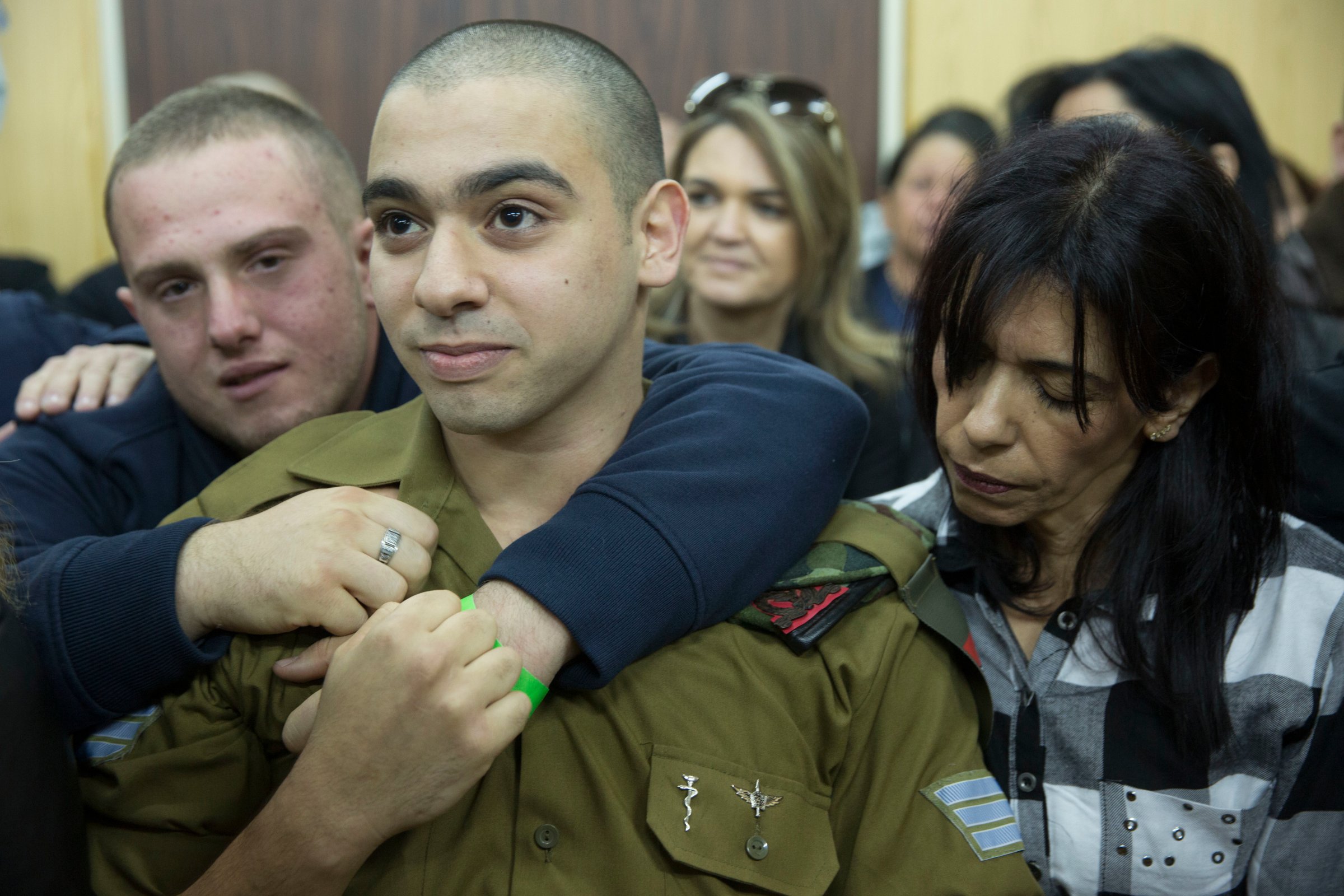
The deep faultlines in Israeli society between supporters of tougher security and advocates of the rule of law were laid bare on Wednesday when a Tel Aviv military court found a young soldier guilty of manslaughter in the unlawful shooting of a wounded Palestinian attacker in the West Bank in March 2016.
Politicians sparred and clashes erupted outside the courtroom between right-wing demonstrators and police. Relatives of the soldier stormed out of the proceedings, with one accusing the three military judges of being “disgusting leftists.”
“The public response to the incident reveals a deep fracture in Israeli society,” Yohanan Plesner, president of the Israeli democracy Institute told TIME. “A significant part of the Israeli public does not identify with the [military’s] code of ethics and its interpretation in practice by army officers.”
The killing by Israeli Defense Forces Sgt. Elor Azaria, then 19, of Abed al Fatah a-Sharif, 21, as he lay on the ground after stabbing another Israeli soldier, was captured on video by a Palestinian worker for Israel’s B’Tselem human rights organization.
The footage went viral, catapulting the case – one of about 150 questionable killings of Palestinians by Israeli soldiers, according to human rights groups – into international headlines and onto Israel’s political agenda. Azaria was arrested immediately and court proceedings began a few days later.
Azaria had testified that a-Sharif, who had been lying almost motionless on the ground for several minutes before the soldier shot him in the head, appeared to be moving. Azaria said he feared a-Sharif was trying to grab a knife or detonate a bomb belt, so he was justified in shooting him. The defense also claimed the video had been edited and that a-Sharif was already dead.
In a verdict that took nearly three hours to read to a packed room at Israel’s military HQ in the heart of Tel Aviv, Judge Maya Heller dismissed Azaria’s testimony as “evolving and evasive,” swatting aside each element of the defense as “not credible.” In a unanimous decision, the panel found him guilty of manslaughter and reserved sentencing for a later date.
The verdict triggered an immediate avalanche of criticism from Israeli conservatives, who have argued that Azaria should never have been charged in the first place. Justice Minister Ayelet Shaked and Education Minister Naftali Bennett, both of the right-wing Jewish Home party, called for the soldier to be granted an immediate pardon. They were joined by Yisrael Katz, the transportation and intelligence minister and rising star of Prime Minister Benjamin Netanyahu’s Likud party.
IDF chief of staff Gadi Eisenkot had earlier defended the trial, saying just a day before the verdict that he was confident justice would be served. Most liberal commentators, meanwhile, praised the conviction, hailing it as proof that the Israeli army was capable of policing itself, although a former Labor Party leader also called for the soldier’s release, citing a case in 1984 when Israeli security officers executed two Palestinian bus hijackers after capturing and interrogating them. Palestinians dismissed the trial as a sham.
Azaria’s conviction pitched Israel’s dueling factions against each other once again, just weeks after President Obama’s sharply divisive decision not to veto a UN Security Council resolution branding Israel’s West Bank settlements as “illegal.” Right-wingers denounced the move and Obama’s apparent role in encouraging its passage, even though the U.S. formally abstained.
Both have exposed the shifting domestic political forces that complicate Israel’s attempts to forge a coherent foreign policy. Netanyahu is nominally in favor of the establishment of a Palestinian state in the West Bank and Gaza, but is accused by the U.S. of undermining efforts to create it. Meanwhile, Bennett’s Home party is fomenting pressure from the right to expand the settlements still further.
The conviction, though, could put Netanyahu in a tricky position. While Bennett and his supporters supported Azaria from the moment of the shooting, Netanyahu has flip-flopped, just as he has on settlements. At first, Netanyahu backed his then-defense minister, Moshe Yaalon, and Israel’s military chief of staff, in condemning the killing, which occurred during a wave of stabbing attacks by Palestinians on Israeli security forces and civilians in the West Bank and Jerusalem.
“What happened today in Hebron does not represent the values of the IDF,” Netanyahu said in March. “The IDF expects its soldiers to behave level-headedly and in accordance with the rules of engagement.”
But a week later, as Bennett led right-wing cabinet members arguing that putting Azaria on trial would undermine military morale, Netanyahu phoned the soldier’s parents to express his sympathy in what was widely interpreted as a slap in the face to his military commanders. In September, he was forced to apologize after comparing the ordeal of Azaria’s parents to the suffering of families of bereaved soldiers.
Wednesday’s verdict was also particularly uncomfortable for defense minister Avigdor Liberman, leader of the Yisrael Beytenu party. Before he was appointed, Liberman led protestors in March outside a military court where Azaria was being arraigned, sharply criticizing his predecessor, Moshe Yaalon. “The claim has collapsed, I’m sure he will be acquitted,” Liberman said, accusing Yaalon of “pre-determining the results of the military investigation. This harms the military.”
After the result was announced he executed a neat U-turn, urging all parties to “respect the legal decision and to exercise restraint” no matter their opinions. “A verdict has been delivered,” he said. “Even those, like myself, who like the verdict less, must accept and respect it.”
More Must-Reads From TIME
- The 100 Most Influential People of 2024
- The Revolution of Yulia Navalnaya
- 6 Compliments That Land Every Time
- What's the Deal With the Bitcoin Halving?
- If You're Dating Right Now , You're Brave: Column
- The AI That Could Heal a Divided Internet
- Fallout Is a Brilliant Model for the Future of Video Game Adaptations
- Want Weekly Recs on What to Watch, Read, and More? Sign Up for Worth Your Time
Contact us at letters@time.com